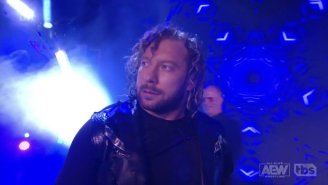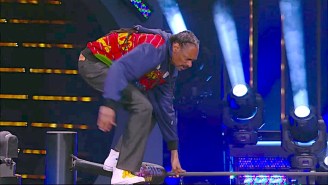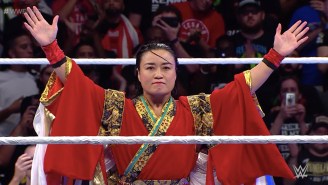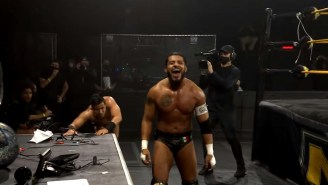WrestleMania is, as we’re often reminded, the grandest stage of them all. It’s a global phenomenon — everyone knows that no matter how terminally uncool pro wrestling can get in mainstream culture, WrestleMania is a certifiable Very Big Deal.
If you’re a fan of women’s wrestling, however, WrestleMania hasn’t always given you very much to look forward to.
Initially an assignment was pitched about “the evolution of the Divas.” I’ve thought long and hard about how to approach the topic because, realistically, there’s no such thing. The WWE Divas of 2016 aren’t leveled-up versions of every female performer who came before them. They aren’t the first women who know how to wrestle, and to insinuate that is frankly insulting to every lady wrestler who came before who had the talent, but never the spotlight. There’s no greater indication of that an examination of the history of women at WrestleMania.
From WrestleManias 1 through 31, ten of these shows did not include a women’s match (the most recent being in 2013). Twelve of those 21 have been singles matches, including a “catfight,” a Playboy Pillow Fight, and a Playboy Lumberjill Match. There was also a Playboy Evening Gown match, but that was a tag team effort.
No match has gone over ten minutes. The longest match was at WrestleMania 14 between Marc Mero and Sable against Luna Vachon and The Artist Formerly Known As Goldust. Five matches have featured men, including Val Venis as referee, and the Divas Battle Royal won by Santino.
The average length of a Divas effort at WrestleMania is roughly five minutes. Molly Holly gave up her hair at WrestleMania XX for a 5:04-minute match. Ten women’s matches couldn’t crack four minutes, half of those didn’t even crack three. Alundra Blayze — a current WWE Hall of Famer and important voice in the so-called “Divas Revolution” — barely went over three in her only WrestleMania appearance against Leilani Kai at WrestleMania X. There was no women’s match the following year, but Pam Anderson and Jenny McCarthy did get to play valet, so…
On paper (screen?), the basic statistics of women’s matches at WrestleMania are depressing enough, but none of these include the other, tertiary roles women have played. Valets? Sure. Back-up dancers? Of course. Faceless slaves to King Triple H? That sounds hyperbolic, granted. Papa Hunter probably just wanted a spot for his NXT performers at WrestleMania, and yes, it’s another homage to Conan the Barbarian, but damn, the image presented is undeniably uncomfortable:
The ‘Divas Revolution’ thus far has garnered mixed results. A prevailing attitude of distrust at its inception was more than deserved given WWE’s history. After all, a corporate revolution can’t happen when the oppression is coming from inside the house. ‘The Divas Revolution is failing!’ cried Twitter and message board posters at every turn. But a different, much more telling reaction came from female fans: please don’t take this away from us.
Though wrestling is a ‘sport’ born on the fringe, made by outsiders for outsiders, women, POC, and queer wrestling fans have had to occupy a space even further on the outskirts. Like other ‘nerdy’ or athletic pursuits, it’s hard to navigate the gatekeepers constantly questioning the validity of a fandom that is dominated by/caters to cis-white males. You can love pro wrestling more than anything else, you can have been a life-long fan, you can have friends who are pro wrestlers, you can literally make pro wrestling *your actual job* and you will still get called upon to prove that you are a fan, you deserve to occupy space in the world of wrestling, and you’re in it for the ‘right reasons’. It’s exhausting, but this is the climate WWE has helped cultivate and maintain for decades.
The distrust extends past what you see in the ring. Alarming accounts of sexual harassment and mistreatment of women in WWE developmental came out during the exposure of Bill DeMott and his legacy of abuse. Though he’s no longer with the company, those who allowed those abuses to continue and worked to cover them up remain in power. It was rumored that Jane Geddes, a female executive who reportedly spoke up on behalf of female talent, was moved to a different position away from NXT, and then out of the company altogether. When Stephanie McMahon champions the ‘girl power’ of WWE, she touts the importance of being the only woman in the room, rather than the necessity of increasing the number of female voices in the executive conversation. All of these things are concerning, to say the least.
The call for positive representation onscreen has gotten louder and louder, and in the last few years, that call has seemingly been answered. NXT favorites morphed into The Four Horsewomen — a group with an undeniable presence and an increasing legacy of brilliant matches. Women like Alexa Bliss and Dana Brooke were finally given fully-fleshed out characters. Indie POC powerhouses like Kana and Athena were signed, with one of them about to face down the world’s most pure babyface Bayley for the NXT Women’s Championship. The women’s title will be contended in what’s already scheduled to be the longest women’s match in WrestleMania history. These are good things. These are great things. But still the fear that we could lose it all exists because we’ve been conditioned to wait for that other shoe to drop.
The greatest challenge of the Diva’s Revolution has been learning to trust that we’ll be allowed to keep something that means so much to us. Women of a certain generation who were inspired by those small chances Divas were given in the past know that as much as WWE will point to Lita and Trish Stratus as trailblazers and groundbreakers, they were still put through the wringer of onscreen sexual humiliation, slut-shaming, bra and panty matches, et al. Women like Ivory, Jazz, or Molly Holly were subject to similar humiliations. The term “Diva” conjures images of women who had to trade wrestling contests for bikini contests. WWE continually teaches us that women are boy-crazy, horned-up sex objects who can’t maintain friendships with one another, can never be trusted, and always, always come second to the men. The bitches always be trippin’, amirite? Even manic pixie dream girl AJ (who still maintains a ferocious fanbase despite her early retirement) was an indecisive, man-eating ‘crazy chick,’ constantly berated and slut-shamed on commentary and mistreated by every male figure in her onscreen life. Whoa, an alt-girl who wanted to wrestle being pushed to the edge of creative’s throbbing Madonna-Whore complex? Hrm…
On Sunday, Charlotte and Sasha Banks will step out from behind Triple H and, alongside Becky Lynch, make WrestleMania history. While some will view this as just another match, these women are carrying the weight of the past 31 years of WrestleMania on their shoulders. To some, they’re (sadly) still proving that they deserve the time and focus they’ve been given as wrestlers alongside WWE’s male superstars. To others, however, the grandest stage of them all is where these three women will stand up and prove that they are not the product of evolution. They’re not only fighting for a championship, but for those 103 female competitors at WrestleMania who came before them who weren’t given the same chances. They’re fighting for every woman who has felt an ounce of hope that female competitors in WWE could be wrestlers, or simply seen as people in the past, only to be continually let down. No pressure, right?
Women are not Pokemon. WWE has not created a revolution, or a sudden influx of female fans who weren’t there before. Women have always been talented. Women have always loved wrestling. We don’t need to prove anything to WWE, WWE needs to show its work and prove itself to us. We’re here, we’ve always been here, and now that these women have grabbed a hold of that spotlight, none of us are ever f*cking letting go.






